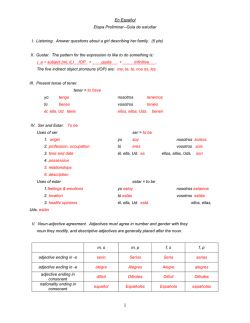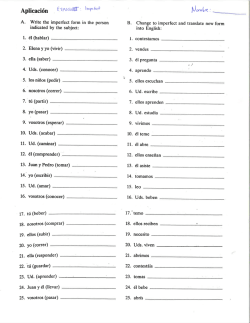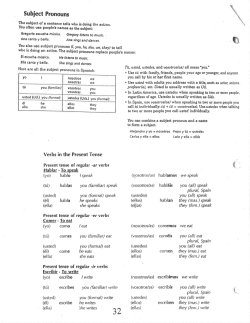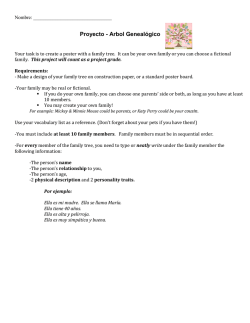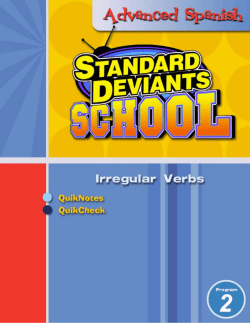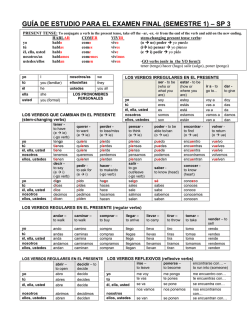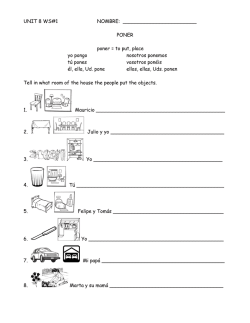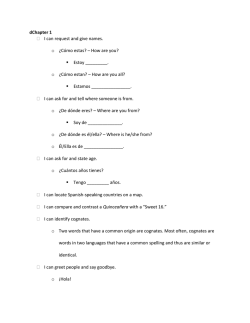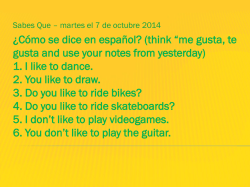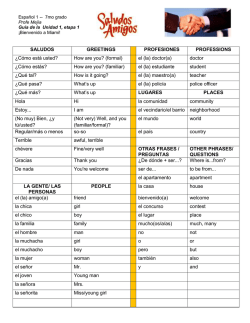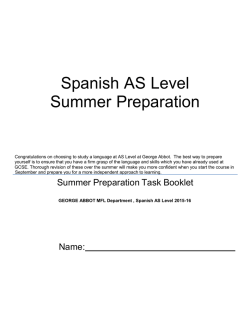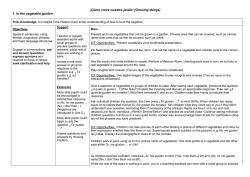
Spanish 3 Fall Midterm Review (Everything in Chapters 1 &
Spanish 3 Fall Midterm Review (Everything in Chapters 1 & 2) Gustar –page 10 1. A mí (me gusta/me gustan) leer libros. 2. A ti (te gusta/te gustan) comer. 3. A ella (le gusta/le gustan) las películas de amor. 4. A él (le gusta/le gustan) el béisbol. 5. A nosotros (nos gusta/nos gustan) charlar. 6. A vosotras (os gusta/os gustan) ir de compras. 7. A ellas (les gusta/les gustan) los vestidos azules. 8. A ustedes (les gusta/les gustan) el perro. Yo Me gusta = I like Tú Te gusta = You like Él, ella, Usted Le gusta = He/She likes Nosotros Nos gusta = We like Vosotros Os gusta = Y’all like Ellos, ellas, Ustedes Les gusta = They like …A mí me gusta(n)…… porque…… A mí no me gusta(n)…… porque…… In this activity, look at sentences #1-6 and determine if you should finish your sentence with A or B. You should be able to tell which one to choose based on how “gusta or gustan” looks. A = la pizza, B = las hamburguesas 1. A mí me gusta __. 4. A ellos les gusta __. 2. A ti te gustan __. 5. A nosotros nos gusta__. 3. A ella le gustan __. 6. A vosotros os gustan___. Present Tense Verbs (refer to the Guide to learning Present Tense on my teacher webpage) page 12 in your book -Conjugate in the form I ask for: (all regular verbs) 1. yo/comer 2. tú/ hablar 3. ella/conversar 4. él/ charlar 6. vosotros/ escribir 7. nosotros/ vivir 8. ellas/ leer 9. Usted/ cocinar 10. Ustedes/ preparar Stem-Changing Verbs (refer to the Guide to learning Present Tense on my teacher webpage) Probar, Preferir, Poder, Dormir, Almorzar, Volver, Jugar, Pensar, Empezar, Querer (page 12) Pedir, Servir (page 14) *Do the spelling change in all forms except Nosotros and Vosotros (just add your ending like normal there) Irregular Present Tense Verbs (refer to the Guide to learning Present Tense on my teacher webpage) Salir, Poner, Hacer, Traer, Saber, Venir, Tener (page 14 – weird “Yo” form only, the rest will conjugate like normal) Reflexive Verbs – page 14 Levantarse = to get up Translate into Spanish: Yo me levanto (I get myself up) Tú te levantas (You get yourself up) Él, ella, Usted se levanta (He/she gets him/herself up) Nosotros nos levantamos (We get ourselves up) Vosotros os levantáis (You all get yourselves up) Ellos, ellas, Ustedes se levantan (They get themselves up) 1) I brush my teeth. 2) I bathe myself. 3) I dress myself. 4) I comb my hair. 5) I wake myself up at 6. 6) I shave myself. 7) I stretch myself. 8) I take off my clothes. 9) I put on my pajamas. 10) I put myself to bed early. Examples: Yo voy a lavarme los dientes. = I am going to brush my teeth. Me lavo los dientes. = I brush my teeth. Vocabulary – Ch. 1 page 37 – study on your own Indirect Object Pronouns with Dar and Decir VERB: DAR = TO GIVE DECIR = TO SAY/TELL INDIRECT OBJECT PRONOUNS Yo doy digo me Tú das dices te Él, ella, Usted da dice le Nosotros damos decimos nos Vosotros dais decís os Ellos, Ellas, Uds dan dicen les Examples: Yo te doy un regalo. = I give you a gift. Ella me da un regalo. = She gives me a gift. More practice with Indirect Object Pronouns: 1. 2. 3. 4. 5. 6. Yo _____ doy un regalo. = I give you a present. La profesora _____________ da tarea. = The teacher gives us homework. Ella les ________________ (decir) <<¡ten cuidado!>> Ellos te ___________________ (decir) <<¡pon la mesa!>> We give her new shoes. = _________________________________________ You give me a headache. (un dolor de cabeza) = _____________________________ Saber and Conocer – page 52 VERBS: SABER = TO KNOW CONOCER = TO KNOW Yo Sé Conozco Tú Sabes Conoces Él, ella, Usted Sabe Conoce Nosotros Sabemos Conocemos Vosotros Sabéis Conocéis Ellos,ellas, Ustedes Saben Conocen 1. Tú (sabes/ conoces) arreglar carros. 2. Ella (conoce/ sabe) preparar un pastel. 3. Él (sabe/conoce) el teléfono del colegio. 4. Mis hermanos (conocen/saben) todos los profesores del colegio. 5. Mi vecina (conoce/sabe) bien la última moda. 6. Mi tía (sabe/conoce) bien el vecindario. 7. Yo (sé/conozco) diseñar aviones. 8. Yo (sé/conozco) a mis compañeros de clase. 9. Mi primo (sabe/conoce) apagar incendios. *Saber – fact, piece of information, skill learned for a job, knowledge *Conocer – familiar/ personal, knowing a person, a neighborhood, the city you grew up in 10. Mi padre y yo (sabemos/conocemos) muchas personas. Ser + adjectives of nationality – see page 54 for all of the nationalities Yo soy, Tú eres, Él/ella/usted es, Nosotros somos, Vosotros sois, Ellos/ellas/ustedes son Example: Yo soy chilena. = I am Chilean. Ella es española. = She is Spanish. Vocabulary – Ch. 2 page 77 – study vocab # 1 from this page on your own. Use your tener phrases…study page 22 1. I am cold. 2. You are hungry. 11. Y’all have to pick up the living room. 3. He is thirsty. 12. Those girls have to do the dishes. 4. We are in a hurry. 13. I have to vacuum. 5. Y’all are sleepy. 14. He feels like eating ice cream. 6. My sister is 10 years old. 15. We feel like listening to music. 7. I am hot. 16. Y’all feel like reading. 8. She is lucky. 17. I feel like swimming. 9. You have to take out the trash. 18. They (girls) feel like going shopping 10. We have to clean the bathroom. Remember your Golden Rule about using 2 verbs…. Example: Yo debo hacer los quehaceres hoy. (Conjugate the first verb, leave the second one in the infinitive) 1. We should go to the movies. 5. They (girls) want to play tennis. 2. He can go out. 6. I like to dance. 3. I plan to eat at 3:00. 7. You (formal) likes to watch tv. 4. You prefer to dance all day. 8. She should sing today. Question words…¿ ? 1. 2. 3. 4. Why? How? Where? What? ING… Present progressive form… (ando/iendo’s) what you are doing now 5. Who? 6. When? 7. How much? Your present participle is: the verb “Estar” + You add “ando” to AR verbs (Hablar) Estoy hablando And you add “iendo” to ER & IR verbs. (Comer) Estoy comiendo Yo estoy hablando. = I am talking. Special spellings: (be careful) Dormir durmiendo Leer leyendo 1. I am sleeping. 6. He is writing. 2. You are talking. 7. You are singing. 3. She is eating. 8. Y’all are drinking Sprite. 4. We are swimming. 9. I am walking. 5. They are reading. 10. You (formal) are drawing. Ir a + infinitive (Yo voy a __verb___) – what you are going to do in the near future Yo voy a escribir una carta. = I’m going to write a letter. Tú vas a dormir ésta noche. = You are going to sleep tonight. Ser and Estar page 62 Use Ser – DOTIPT Use Estar – CHELPT Describe Condition Origin + nationality Health Time + date Emotion Identification Location Possession Progressive This is the way I am This is the way I look With food: Ser – what the food is normally like or a general statement about the food. Example: La sopa de Panera Bread es deliciosa. (Panera Bread’s soup is delicious) Estar – what the food is like at that particular moment you are tasting it. Example: Las papas fritas están saladas. (The french fries are salty) Preterite (past tense) VERB: Yo Tú Él, ella, Usted Nosotros Vosotros Ellos, ellas, Ustedes -Ar verb endings é aste ó amos asteis aron -Er/-Ir verb endings (the same!) í iste ió imos isteis ieron Examples using Preterite past tense: Verb conjugation VERB: Arreglar (to Barrer (to fix) sweep) Yo Tú Él, ella, Usted Nosotros Vosotros Ellos, ellas, Uds arreglé arreglaste arregló arreglamos arreglasteis arreglaron barrí barriste barrio barrimos barristeis barrieron VERB: Sacudir (to dust) Yo sacudí Tú sacudiste Él, ella, Usted sacudió Nosotros sacudimos Vosotros sacudisteis Ellos, ellas, Uds sacudieron ~~~~~~~~~~~~~~~~~~~~~~~~~~~~~~~~~~~~~~~~ Irregulars!! …also notice no accent marks! VERB: Hacer (to do/ to make) Ir (to go) fui I went Yo Tú Él, ella, Usted Nosotros Vosotros Ellos, ellas, Ustedes hice I did/I made hiciste hizo hicimos hicisteis hicieron fuiste You went fue He/She went fuimos We went fuisteis You all went fueron They went The Present tense is used to talk about what is happening now/today. There are several different categories of verbs in Present tense, including regular verbs, stem-changing verbs, and irregular verbs. It is important to remember which verbs fall into which category. Regular Present Tense - AR verb endings: - ER endings: -IR endings: Yo o o o Tú as es es Él, ella, Usted a e e Nosotros amos emos imos Vosotros áis éis ís Ellos, ellas, Ustedes an en en Steps to conjugating a verb: 1. Start with the infinitive (a verb that has not been changed at all). Example: comer, hablar, vivir, etc. 2. Then drop off the last 2 letters (-ar, -er, -ir) and write down what is left. Example: com__, habl__, viv__. 3. Then, add the endings you see in the chart above. Example: como COMER = to eat Yo (I) como HABLAR VIVIR hablo vivo hablas vives habla vive (I eat) Tú (You - informal) comes (You eat) él (He), ella (She), Usted (You – formal) come (He/She eats) Nosotros (We) comemos (We eat) hablamos vivimos Vosotros (You all) coméis (You all eat) habláis vivís comen (They eat) hablan viven ellos (They – guys), ellas (They – girls), Ustedes (They – formal)
© Copyright 2026
